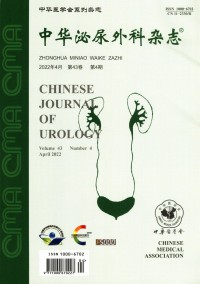肾癌根治术后急性肾损伤的危险因素分析
Q4 Medicine
引用次数: 0
摘要
目的探讨根治性肾切除术后急性肾损伤(AKI)的危险因素。方法回顾性收集2013年2月至2017年9月复旦大学中山医院行根治性肾切除术的920例肾细胞癌患者的临床资料。本研究纳入男性612例,女性308例,中位年龄60岁(20-75岁)。高血压313例(34.0%),糖尿病132例(14.3%),有吸烟史111例(12.1%)。术前肾功能分期1 ~ 2期829例(90.1%),3 ~ 5期91例(9.9%)。术前血红蛋白低于正常下限391例(42.5%),白细胞计数增高66例(7.2%),血小板增高72例(7.8%)。白蛋白低于正常下限65例(7.1%),乳酸脱氢酶升高73例(7.9%)。血尿素氮增高48例(5.2%),尿酸增高123例(13.4%),尿蛋白阳性88例(9.7%)。开腹手术496例(53.9%),腹腔镜手术424例(46.1%)。术后48小时内随访血清肌酐变化。AKI是根据KDIGO标准定义的。采用Logistic回归分析患者术后2-3期AKI的危险因素。结果住院期间发生1-3期AKI患者分别为627例、42例和10例。单因素分析显示,糖尿病(OR=2.34, P=0.01)、尿蛋白阳性(OR=2.22, P=0.04)和白细胞计数升高(OR=2.54, P=0.02)与术后2-3期AKI显著相关。多因素logistic回归分析显示,糖尿病(OR=2.51, P=0.01)和白细胞计数升高(OR=2.69, P=0.02)是术后2-3期AKI的独立危险因素。结论伴有糖尿病或术前白细胞计数增高的肾癌患者在根治性肾切除术后更易发生2-3期AKI。关键词:癌;肾细胞;肾切除术;急性肾损伤本文章由计算机程序翻译,如有差异,请以英文原文为准。
Analysis of risk factors for acute kidney injury after radical nephrectomy
Objective
To explore the risk factors of acute kidney injury(AKI) in patients after radical nephrectomy.
Methods
We retrospectively collected clinical information of 920 patients with renal cell carcinoma who underwent radical nephrectomy at Zhongshan Hospital, Fudan University from February 2013 to September 2017. There were 612 male and 308 female patients included in this study, with a median age of 60 (range from 20-75 years). 313 patients (34.0%) had hypertension, 132 patients (14.3%) had diabetes, and 111 patients (12.1%) had smoking history. 829 cases (90.1%) were in stage 1-2 for preoperative renal function staging, and 91 cases (9.9%) were in stage 3-5. Preoperative hemoglobin was lower than the lower limit of normal in 391 cases (42.5%), white blood cell count increased in 66 cases (7.2%), and platelet increased in 72 cases (7.8%). Albumin was lower than the lower limit of normal in 65 cases (7.1%), lactate dehydrogenase increased in 73 cases (7.9%). blood urea nitrogen increased in 48 cases (5.2%), uric acid increased in 123 cases (13.4%), and urinary protein was positive in 88 cases (9.7%). 496 cases (53.9%) underwent open surgery and 424 (46.1%) underwent laparoscopic surgery. The changes in serum creatinine were followed up within 48 hours after surgery. AKI was defined according to the KDIGO standard. Logistic regression was used to analyze the risk factors for postoperative stage 2-3 AKI in patients.
Results
Stage 1-3 AKI occurred on 627, 42 and 10 patients during hospitalization, respectively. Univariate analysis showed that diabetes (OR=2.34, P=0.01), positive urine protein (OR=2.22, P=0.04), and elevated white blood cell count (OR=2.54, P=0.02) were significantly associated with postoperative stage 2-3 AKI. Multivariate logistic regression analysis showed that diabetes (OR=2.51, P=0.01) and elevated white blood cell count (OR=2.69, P=0.02) were independent risk factors for postoperative stage 2-3 AKI.
Conclusion
Renal cell carcinoma patients with diabetes or preoperative elevated white blood cell count are more likely to develop stage 2-3 AKI after radical nephrectomy.
Key words:
Carcinoma, renal cell; Nephrectomy; Acute kidney injury
求助全文
通过发布文献求助,成功后即可免费获取论文全文。
去求助
来源期刊

中华泌尿外科杂志
Medicine-Nephrology
CiteScore
0.10
自引率
0.00%
发文量
14180
期刊介绍:
Chinese Journal of Urology (monthly) was founded in 1980. It is a publicly issued academic journal supervised by the China Association for Science and Technology and sponsored by the Chinese Medical Association. It mainly publishes original research papers, reviews and comments in this field. This journal mainly reports on the latest scientific research results and clinical diagnosis and treatment experience in the professional field of urology at home and abroad, as well as basic theoretical research results closely related to clinical practice.
The journal has columns such as treatises, abstracts of treatises, experimental studies, case reports, experience exchanges, reviews, reviews, lectures, etc.
Chinese Journal of Urology has been included in well-known databases such as Peking University Journal (Chinese Journal of Humanities and Social Sciences), CSCD Chinese Science Citation Database Source Journal (including extended version), and also included in American Chemical Abstracts (CA). The journal has been rated as a quality journal by the Association for Science and Technology and as an excellent journal by the Chinese Medical Association.
 求助内容:
求助内容: 应助结果提醒方式:
应助结果提醒方式:


